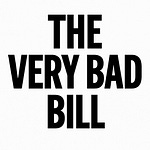Some of you may know I used to be a news anchor. I did breaking news. I went out into snowstorms, into hurricanes. In fact, it was during a tornado that I finally thought, "I'm done. I’m not made of Kevlar. Why am I out here?"
So today’s breaking news story connects directly to two of my former lives: one as a practicing attorney and my current life as a writer working on my next book.
Let me say this upfront: I am not a Sean Diddy Combs supporter. He is a horrible, terrible person who has used coercion and harassment. He has long been alleged to be a terrible actor in the music industry. For years.
But the problem today is not the verdict. Because it was the right verdict, but for the wrong reason. So let me explain.
PLEASE listen or read until the end!
I used to do divorce and custody work for victims of domestic violence. That’s what I did. I worked with people who had been abused and terrorized. Where I worked, we had clients who didn’t make it to court because they were killed before they could even get there. So I’m not someone talking about something I don’t understand. I want to be clear about that.
The issue here is that prosecutors overcharged and brought the wrong charges in this case.
The major charges Sean Diddy Combs was facing were RICO, racketeering, organized crime, and enterprise-level charges. These charges were originally designed to go after the mob to combat the creation of interstate commerce by illegal means. It was a novel way to get at organized crime.
But I could tell from the beginning: this was an overcharge. It was the wrong charge.
So today’s decision isn’t about power, money, or disbelieving victims, in THIS CASE. It’s simply that the wrong charge was brought.
The jury wasn’t swayed by fame; the law swayed them. The prosecutors never proved that there was a racketeering interstate enterprise. They said they had people they could call, like his operations person, but they never called those people.
That doesn’t mean Sean Combs didn’t commit a crime.
He was convicted of two crimes related to prostitution, or more specifically, to the illegal movement of people across state lines for the purpose of prostitution. That’s under the Mann Act.
But none of this is really the issue.
The real issue is domestic and sexual violence and how we, in this country, shame and silence victims of domestic and sexual violence. We make them afraid to come forward at the time when these cases could actually be prosecuted.
There was a conspiracy, but it wasn’t a RICO conspiracy. It was a cultural conspiracy that prevented Cassie and the Jane Doe victim from being able to say, at the time:
“I am a victim of domestic violence. I am a victim of sexual violence. And I want to bring a charge.”
We saw the same thing in the Harvey Weinstein situation. Women at the time felt they could not speak out because he had too much power. That’s really what it comes down to.
Deborah Tuerkheimer, a professor from Northwestern Law School, wrote a book called Credible. You should read it. It’s about why we doubt accusers and protect abusers.
That’s the problem. There is a credibility complex.
Neither Cassie nor Jane Doe was the “perfect victim.” And in order for us, as a society, to believe the violence or sexual abuse either of them endured (at the time it happened), they knew they’d be held to a higher standard. Because, well, they had been in a relationship with him. Maybe even having consensual sex with him. They had agreed up to the point that they didn’t agree.
We, as a society, are very punishing of women in those circumstances. That’s what Credible talks about.
Again, the verdict isn’t wrong, “legally,” it’s the right verdict. But it was the wrong charge. And the reason it was the wrong charge is that we do not make space culturally for victims to come forward at the time when the charge should have happened.
Let’s take Cassie. In that video, when she is beaten in that hallway, she is not empowered. At that point, Sean Diddy Combs is at the apex of his power.
You may think, “Well, that’s RICO.” No, it’s not RICO. Sean Diddy Combs was a powerful man. But that’s not the same thing.
Cassie knew people weren’t going to believe her at that time. Not about physical abuse. Not about sexual violence.
Then, the men at the hotel who conspired to hide the video didn’t report it, even though they had seen what had happened. That’s how we got here because we, as a society, turn our faces away from domestic violence.
The charges should have come then. Or earlier. But because we are so deeply conflicted about who a victim is, about what victimization means, there was no opportunity for these women to come forward then.
Now, when we talk about a broad-based conspiracy, a lot of people wonder: if the prosecutors had a RICO case, where were all the other victims? Where were all the other people?
I don’t know what was going on in the prosecutors’ minds. Maybe they didn’t have the information. But based on what they presented to the jury, the jury made the right decision even if it wasn’t for the right reasons.
The jury that should have sat in judgment of Sean Combs was the jury that should have been empaneled after he beat Cassie at that hotel.
The jury that should have heard from Jane Doe should have been empaneled at the time she was seeking justice.
And justice delayed is justice denied.
That delay, rooted in how we, culturally, see victims is why justice was denied today.
If you're upset about this verdict, let me tell you something: that book Credible has powerful insights about how we handle sexual violence in relationships. It breaks down state laws that determine whether or not you can say you were raped based on how hard you fought back, or whether you were in a relationship with the perpetrator.
We don’t have a society that structurally acknowledges the impact of victimization. We are deeply uncomfortable with it.
Which is why this is the topic of my next book.
Because this is the issue. This is how we get Donald Trump in the White House. This is how we get public officials who have been accused of sexual assault, of rape and they still remain in power. Because we value victimizers, or the status quo, more than we value victims.
I don’t know what the judge will decide today. I’m on the West Coast, so we’re still waiting to see if Sean Combs can be released.
But if he had been convicted of the RICO charge, it would’ve been appealed. Because it was the wrong charge, at the wrong time.
The right time was upstream. That’s something I’m going to explore in my next book.
Because dealing with harm downstream after the injury is wildly ineffective.
So that’s my take on today’s breaking news.
Let me be very clear: I am not invalidating Cassie or Jane Doe. I am not saying Sean Combs is a good person. I am saying this was the wrong charge and therefore, the right verdict.
There were other charges. There were other times he should have been held accountable.
But because of how we treat victims, especially those of domestic violence and sexual abuse, we failed to support them when it mattered.
If Cassie had brought charges back then, public opinion would not have been on her side. History tells us that. Credible tells us that. Everything tells us that.
So if you’re feeling bad about this verdict, look in the mirror.
Ask how we, as a society, treat victims at the time the violence actually happens.
This is our special report.
And finally, I want to say thank you to my now 1,000 subscribers. I am so grateful.
I hope we can grow this Substack together. Next week we’ll talk about how we can do that and some special things coming up now that we’ve hit the 1,000-subscriber mark.
And yes, there will be a newsletter tomorrow.
Thank you all. Thank you for tuning in.













Share this post